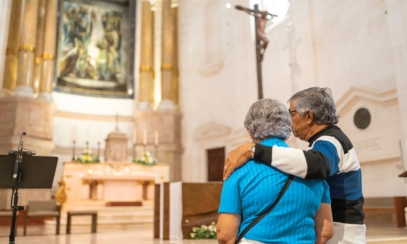
Is it OK to look for ‘signs’ after a loved one dies?
My loved one passed away, but I keep getting these “signs” that I see as being from them that let me know that they are OK. For example, I will see a cardinal (my dad always fed the cardinals outside his window) and I think it is a sign from him. Is that OK for me to think?
My loved one passed away, but I keep getting these “signs” that I see as being from them that let me know that they are OK. For example, I will see a cardinal (my dad always fed the cardinals outside his window) and I think it is a sign from him. Is that OK for me to think?
First, please let me offer my sincere condolences. The death of anyone is meant to be noted and each person deserves to be mourned. As every one of us knows, that grief is even greater when the person who has passed away is dear to us. And as every one of us who has lost someone we love knows, there can be a sense of desperation that leaves us overwhelmed and leads us to a place of grasping.
All of that is to say that looking for some kind of sign is understandable. We all long for something certain. In fact, it is this desire for certainty that could tempt any of us to look for some kind of sign that lets us know that we “don’t have to worry.” I know of people whose hearts were broken who were tempted to believe that numbers on the clock were signs from their loved one. I have known individuals who saw a rainbow (or some other natural phenomena) and interpreted it as an indication that their loved one was communicating with them. Again, in our grief, we can become desperate for anything that could be a consolation for a sorrowful heart.
Yet, while this desire is understandable, it is not advisable.
Now, before we go any further, I would like to make a distinction between “signs” and “reminders” ... Reminders are a gift. Reminders can be incredibly powerful and beautiful. For example, there is a grieving mother who regularly notices when the clock shows a certain time. Each time she notices, she is reminded of her child and that number serves as a consistent memorial for her heart. That memorial moment can be a real blessing, even if it isn’t coming from the one who has died.
The same is true for the case you described: Each time you see a cardinal, you are reminded of your dad and have the chance to reflect on your love for him and the blessing he was in your life. In those moments, you are reminded to pray for him. Even if your dad isn’t the source of the cardinal, the cardinal can still be a consoling reminder of him, even if it is not from him.
And this is the key: For a “sign” to be an actual sign (meaning it is more than a natural phenomenon), it has to come from a supernatural source. We know that a human being on their own does not have the capacity to offer a supernatural sign. Remember what Jesus said about the ineffectiveness of worry? He said, “Can any of you by worrying add a single moment to your life?” (Mt 6:27) This implies that none of us has the innate power to effect a supernatural result. If none of us has the power to “send a cardinal” or “cause a rainbow” in this life, why would we ascribe that power to someone who has passed on?
Because of this, any supernatural sign would either be from God or from the Evil One. These are essentially the only two sources. Even if God allowed an apparition of a saint, it is not the saint who chose to appear to the living, it is only because they were sent by God.
Therefore, the discernment would have to go through this process: First, is this a natural reality or a supernatural phenomenon? If it is merely a natural event, then one could choose to receive that natural event as a reminder of one’s loved one. A person could even see this reminder as one of the natural ways God is involved in our daily lives.
If there is no reasonable way a person could interpret the event as a natural reality, then the event could be a supernatural phenomenon. But in that case, one would have to discern the source: Is this supernatural phenomenon from the devil or from the Lord? That would require quite a bit of discernment (and maybe even some outside help) in order to come to a solid conclusion. Among other things, one would look at the nature of the message itself as well as the fruits of the “sign.”
Finally, it might be important for us to acknowledge some “signs” that people actually do offer. While we are alive, we give the people around us signs of what is most important to us. Our choices are signs and indicators that we offer to all those who see what we value.
If we want those who will outlive us to be able to point to any “sign” in our lives, we can bear witness to the fact that with our choices and with our words, we choose Jesus. Of course, only God knows the heart. We can see only the outside of a person; we can see only the externals of a person’s choice. But our choices do matter, and our choices are real signs. These signs can give our loved ones hope after we have died that we have chosen the Lord – and that we are not just OK but that they can have hope that we are with the Lord.
Father Michael Schmitz is director of youth and young adult ministry for the Diocese of Duluth and chaplain of the Newman Center at the University of Minnesota Duluth. Ask Father Mike is published by The Northern Cross.



